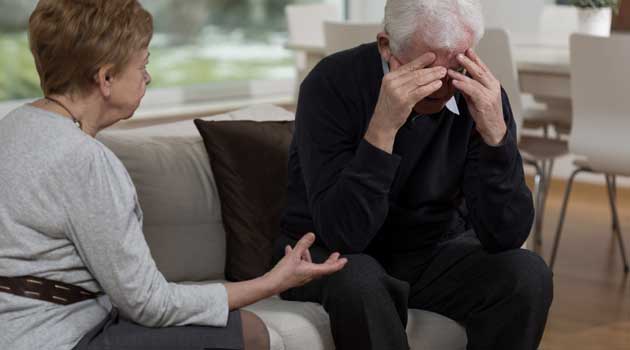To think that London, or anywhere else for that matter, does not belong to any one demographic
Why Are Blokes Obsessed With Noisy Gadgets??
Angela Rayner lashes out and calls Sunak “pint sized loser”.


Retiring from work is a huge life change. You might have visions of brunches in quiet cafes, cruise ship holidays and finally getting top of the house and garden. But it’s worth being prepared for it to be a bit of an emotional rollercoaster, too.
After money, the single most common worry about retirement is how it will affect your marriage. Let's face it, if one or both of you have had full-time careers for the last few decades, suddenly having time on your hands can be an adjustment - as can suddenly having someone else around the house with time on their hands. We hear a lot of talk about ‘Retired Husband Syndrome’ still, but this new phase of life definitely affects all of us. Perhaps you miss a job you loved, seeing colleagues, or simply having a solid structure to your day. If one or both of you is feeling a bit lost in retirement, that can have an impact on your marriage. So what’s the answer?
How retirement affects marriage l Adjusting to retirement together l We want different things l Husband is retired, but I work l How to deal with a retired husband l Husband does nothing l Retired Husband Syndrome l How to give each other space l Downsizing after retirement
For more relationship advice, sign up to Gransnet now...
Even in the most solid of marriages, retirement can bring challenges you didn't expect. Whether one of you is still working or you’ve both stopped, retirement turns daily routines, tasks and everyday intimacy upside down.
According to gransnetters the key to a successful marriage after retirement depends on:
Gransnetters say:
“We always talked as we went along so no surprises or arguments. So far so good.” Jane10
“I think talking through your hopes, dreams, expectations need to be the first move. Perhaps you will find you are both very much planning from the same hymn sheet and therefore there should be no real problems............however if you are both very different with separate hopes and hobbies for instance, you then need a very different approach and there will be a lot of "giving in and taking" until you reach a position you are both happy with and in total agreement. Retirement is that very important stage and well worth planning and getting the best out of it, whether you have elaborate plans or just simple ones much as ourselves.” Panache
This is one of the most common pre-retirement concerns. Will the dynamic of the relationship change when you're together all the time? (Possibly). Will you become irritated with your partner's habits? (Almost certainly). And can you prepare for this new phase of your marriage? (Definitely).
Gransnetters say:
“My joking test of how much I like someone is whether I'd be able to spend a week in a caravan with them, for most of my friends it would probably be a weekend! My way of trying to keep our ship in calm waters is to tell him if he's annoying me, apologise when I'm in the wrong and try to find something to laugh about and most importantly, have my own hobbies and space so I don't have him around all day. Honestly, I think most long term marriages are held together with compromise and an acceptance that nothing is perfect.” Foxie48
“Can I suggest UKMSA Men's Shed Association. Men get together and do whatever men do in a shed!” LindyLou

Surprisingly, yes you can! Many employers offer and encourage pre-retirement courses and seminars where you can ask questions and get a bit of an idea what to expect from retirement. Or have a look online or in your local library to see what’s available in your area. These courses usually look at areas such as personal relationships, losing your social circle and how to maintain a sense of usefulness and achievement outside of paid work.
Gransnetters say:
“When you do retire you should have some sort of plan. You will have time on your hands to do what you want, hobbies, volunteering, travel, visit friends, family etc. Of course all this starts with your finances. Maybe there are some online retirement planning courses you could check out? It's as well to have a plan, whether you choose to go this year or not.” DaisyMae
“I went on a pre-retirement course. It was very helpful and made me think about and face up to things that I was avoiding. The best piece of advice was to not commit to anything for 6 months, until you had a better idea of how things were going to work out & how you wanted to spend your time.” JanieAinsworth
Spending such a large chunk of our lives at work does affect our personality and when we retire, we're leaving behind a part of ourselves. Whether or not that part will be missed depends on how much you enjoyed your job, how well prepared for retirement you are and whether you have a good support system in place. If you’re worried about how you'll feel without your job, start planning your retirement early so that you know what you will be doing for the first few months.
Gransnetters say:
“I retired from teaching at 60. I loved teaching, it was the passion of my life for many years but I did not miss it. I planned to downsize when I retired so having a project was good. At first I struggled with not rushing about but now, two and a half years on, I enjoy taking my time. I took up art and other crafts and have enjoyed those too. It also helped that my first grandchild was born six months into my retirement so he has kept me busy. I was ready to retire though, and that made the difference. If you aren't ready, then keep working.” GrandmaBatty
“If you don't feel ready to retire and you are able to keep working, then do so. An old school friend advised me not to retire unless I really wanted to. I was worried more about the financial aspect but managed well, and like everyone else, wondered how I found time to work. I certainly realised how tired I had been. The important thing is to go when you feel ready; don't be hassled into it because people say you should.” EazyBee
This will likely come down to how easily you adjust to change in general. We’re all different. A factor you can change is how prepared you are for retirement; if you feel like you have an idea of what to expect that will help. One thing that can take some time is finding the right balance between hobbies, travels, voluntary work, grandchild care arrangements, social meet-ups, time with your partner and anything else you enjoy. It often takes time to figure out what works for you both so have a chat beforehand about what you’re both hoping for in terms of time spent together and apart. It’s also worth being clear with anyone else who might make demands on your time - you might be dying to spend more time with your grandchildren but if your adult children are thinking you’ll do the school run four days a week and you were thinking it would be nice to have them to stay a night at half term, that needs addressing before anyone gets disappointed. You need to talk about it with your partner first, too, so you present a united front.
Gransnetters say:
“Most people go through a shall I/shan't I period wondering when it's the right time to retire. And most people at the beginning will regret retiring, especially if they enjoyed their job and their colleagues' company. But you do get used to it, there's plenty to do and as they say you'll wonder how you ever had time to work!” BlueSky
“I retired really early (58) as my oh is older than me. It took a period of adjustment but the money worries were soon forgotten - you will find you just adjust to what you have. Make some plans to do some things you’ve always fancied trying, join a class etc. I bet you will love it.” NannaPlenty
One of the best ways to bridge the adjustment process from paid employment to retirement is through voluntary work. Whether you do that together or separately, it can be a real positive. It not only helps you to get out of the house and maintain regular activities, but also gives you a sense of purpose and something to talk about at the end of the day. Yes, fear not - having a rant about Jane from accounts does not necessarily end with retirement!

Gransnetters say:
“Look about you for projects to replace work. Local politics did it for me originally and then I developed a community project which absorbs me in a way my last years at work did not. Fortunately the fear of being useless kicked I when my last child left for university ,so I already knew I needed to be involved in something bigger than myself to be happy. I tried a post graduate course as did many of my male friends, and I also joined a choir, a book club and took up a little gardening. All fine but nothing as good as a volunteer project which will leave a legacy for others when I'm gone. As Erica Jong once said. Get ready to be eighty three my dear.” BlueKitchen192
“If you feel you need more structure to your week, you could do voluntary work. I have been a volunteer adviser for Citizens Advice for five years. I am constantly learning, feel I am still contributing something and am part of a community of people who care about the same things I do. Enjoy your new adventure.” JanCL
If your retirement isn’t living up to your expectations, you’re not alone. We probably all put too much pressure on ourselves to do amazing things but sometimes the budget won’t stretch or real life just takes over. Try to pinpoint exactly what it is that you’re unhappy about or explaining your disappointment to your partner or a close friend who may have words of wisdom. It may be that you need to structure your days a bit more or that you and your partner want different things from retirement.
Gransnetters say:
“I was happy to retire to begin with but it was a bit too early for me chronologically and personally. I have found that I needed a meaty voluntary role to plug the gap.” BigBerthal
"I don't know what on earth is the matter with me. I left my part time job just over a year ago and was very happy to do so. I now volunteer. I often feel down and tired. I am not bored, I have various projects, hobbies, friends to meet up with and go out and about a lot. I never seem to have enough time. My husband seems content and has been retired for a long time, we go out together but I relish a bit of time to myself as it doesn't happen very often. I think he will get fed up if I don't try and sort myself out.” HazelEyes
It sometimes happens that a couple retires together and suddenly find themselves with partners they feel they hardly know. So much time is taken up with our jobs during our working lives that when we retire, we really get to see all sides of our spouse, if we hadn't before. Wanting different things is fine as long as you still want each other and are willing to compromise. Whatever it is you disagree on, give as much as you take of your partner's goodwill and encourage them to do the same.

Suddenly feeling that your compatibility or lack thereof is magnified after retirement is, sadly, normal. It’s also normal to find you have almost nothing in common apart from each other. But, unlike compatibility, that is not necessarily a problem. Now that you and your partner are retired, you have time to explore your own hobbies and interests separately - and then meet up afterwards to enjoy each other's company. If you do not feel as keen to spend time with friends for example, make sure that doesn't limit your partner's availability to be sociable. Likewise, if your partner has no hobbies but you have plenty, make an effort to spend time with your partner, but do set aside the time you need for your own hobbies, too.
Gransnetters say:
“I found retirement is the worst time for relationships. Late DH and I had to go to couple's counselling when we retired. He wanted me home and and I felt released to do my own thing. Our expectations were not aligned. Many relationships do become unstuck at retirement, because issues that were buried for years due to bringing up.and family and working, come to a head.” LinFreed
“We disagree on every single thing. Where to live, what sort of house, whether it has a garden, he wants a garage to fund his expensive hobby, l don’t. I want to release as much money as possible to go on lots of holidays. He wants to release less to fund his hobby. Which I’d kind of be paying for iyswim. And I’m not sure l should be.” FizzlyWizzly
“Sit down and first of all ask him what he would like to happen in retirement what are his dreams, is there anything he really wants. You then have the chance to air your views. I made the mistake of asking DH if there was anything that he really wanted to do it . He bought a motor bike - now it is luckily long gone.” FloraDora9
If your disparity is so great that your relationship is breaking down after retirement, perhaps counselling could be an option. After all, you did make the relationship work while you were working, so this could be more about finding your footing in retirement than your compatibility.
Gransnetters say:
“Counselling is simply a chance to talk and deeply think about a relationship in calm, neutral surroundings. Both of you can air grievances, hopes and wishes. You can talk about what’s good and what’s not. You can see if there is any hope of compromise or change on both sides. Even if he won’t participate you can go alone. A chance to speak in a uncritical environment. It often makes things seem clearer and helps with any future decisions.” CleoPanda
It may sound simple, but talking openly and honestly about expectations vs. reality goes a long way. What did you imagine would happen? How is this different? What can be done to meet your expectations? And are you both thinking along the same lines or is some compromise going to be needed?
Gransnetters say:
“We talked and planned for about two years doing endless spreadsheets. But the best laid plans etc etc. We moved house to an area we both loved and it didn't work out so back to the spreadsheets and moved again. We took up hobbies that didn't work out so we tried others. We had a few rows over who did what in the house believe it or not he wanted to do all the housework and none of the cooking I wanted to share. In the end now ten years after retirement we have arrived at a regime that suits us both but heaven knows where we would have been if we didn't talk about it.” Teetime
“Most of us don't realise what a huge transition retirement is. We certainly didn't plan ahead. Having said that, I remember now how horrified I was when my husband suggested we buy a boat and sail around the world. Imagine being stuck together 24/7 in the close proximity of a boat. In the end we compromised and moved to France, where we had nearly 20 happy years - back in the UK now.” Fennel
It's one thing to have to deal with the issue of time when you have retired together, but it’s an entirely different challenge when only one of you is able to, or wants to, retire. When your partner has retired, but you are still working, the challenge is to balance your different routines so that you feel fairly and affectionately treated. Your partner might expect you to talk to him as soon as you return from work, when all you need is peace and quiet after your work day. Similarly, you might expect a clean house and dinner on the table, but your partner has been too busy with hobbies and activities and trying to get a foothold in retirement to notice housework. Whatever your situation, make sure you each prioritise, giving the other person your attention at least once a day and that you, to the best of your abilities, express what you need your partner to do in order for you to be happy.
Gransnetters say:
"This happened to a friend, her husband was in the police. She solved it by going back to work.” Shandy57
“I am a great believer in working as long as you can if you enjoy it. I work part time from home, my OH is retired now but he appreciates the extra money and keeps himself busy. He shops, cooks and he has his shed for his spare time.” LindyLou

When you're still working, but your husband has retired, there is one thing that you definitely don't have in common any longer...the need to sit down and enjoy some downtime after work. Whether you wind down with a glass of wine and a bath or a cup of tea and a good book, you really do need that time every day and it is important that your husband understands and supports that.
Gransnetters say:
"Oh for a bolt hole. Mine seems content to sit in front of a tv or computer all day. I know exactly what he’ll be doing at any hour of the day unless it’s a rare occasion when he goes out. I just get out of the way as much as I can.” EllieAnne
Do men really struggle more with retirement than women? We don't know, but it certainly seems that women observe men struggle with retirement to a greater extent than they feel troubled by the same issue. Whether you think that your husband misses work, feels less useful, worries about health issues, is bored or just unhappy, you're not alone in finding it difficult to help your other half settle into retirement.
Gransnetters say:
"Mr C is very happy to be at home ‘pottering’ or reading plus the odd jigsaw. I often prefer to be busy outside the home so leave him to it. I found a task list and the question ‘which ones do you feel like doing?’ helped in the early days. Gradually he began to just do some tasks regularly. There’s still a need for a conversation now and again, usually over coffee and cake. We’re all different, this is a transition time so polish your negotiation skills and do check he isn’t feeling particularly unwell.” CornerGran
"Now he is fully retired, and apart from occasional involvement with some charity work, he does almost nothing. I don’t nag him about it, but I do get a bit resentful when he doesn’t even manage to ( for example) peel the potatoes, whilst I am out and about, busy with choirs and voluntary work or family. I really don’t want him to sink into being an old man sitting in his armchair being waited on just yet!” Cabbie21
Some people were born to retire and others, well, they need to learn how to be retired or they just never quite figure out how to enjoy it. The bottom line is that the adjustment process sometimes takes an awfully long time and that's okay.
Sometimes leaving work can feel so stressful, feelings tip into depression. This is more common than you might think, often triggered by no longer feeling ‘useful’ or ‘needed’. If you have a partner who is struggling with depression or low moods following retirement, the best thing you can do is to encourage him to seek help first and foremost. Your GP may be able to make some suggestions and it may help him to get involved with activities such as volunteering so he feels more like he has a purpose and is making a difference. If you don’t feel like you’re getting through to him, perhaps someone in your family or a close friend can help, particularly if they’re also retired and might have the benefit of experience to share.

Gransnetters say:
"The thing about clinical depression is that it just sucks any motivation out of you and any attempts to chivvy him to do things, no matter how well meaning, will make him feel even worse. A kindly chat about seeing his GP to get some help and investigations would be a good starting point." Calipso
Is your partner finding it difficult to enjoy retirement? Whether it is a case of depression, poor health or just lack of adjustment, try to get him out of the house and involved with new activities. Try volunteering, a local charity, National Trust or English Heritage memberships, Mens Sheds, U3A - or make a bucket list of places you'd like to visit together.
Gransnetters say:
“I wondered the same about DH as his work was his life and he had no outside interests (other than family. ) But he thought about it and just before retiring he joined a band and also started playing golf. When this wasn't enough he took on a part time job too! After a couple of years he gave up the job but joined a couple of committees which he is still on. These activities as well as gardening, DIY and family commitments (with a growing number of GC) takes up most of his time. He also relaxes with crosswords and sudoku - and helps with housework so keeps quite busy.” PollyPerkins
For more support, join a community of over 250,000 users now...
Do you feel like your husband has become a little lazy since retirement? Perhaps he never leaves the house or watches far more TV than you'd ever expected him to? Many couples find that they have different ideas of what retirement is, and while a retired partner may appear lazy or unmotivated, perhaps their idea of an ideal retirement is just to do absolutely nothing. And that is absolutely fine - it's their retirement after all. The problem, however, is that if you had other plans, this kind of behaviour can seem selfish. So how do you go about addressing this issue?
Gransnetters say:
"I think it takes time to adjust to retirement and people do it differently. Talk, but also give him time. I started out feeling lazy if I didn't go out every day but as I had little money and didn't yet have a bus pass, it was a bit pointless. He will hopefully settle in but it can take a couple of years." Jaycee
When someone starts to isolate themselves, such as rarely leaving their own home, it’s not necessarily because they don’t want to be outside or around others. It could be a sign that they are unhappy, depressed or even have developed a form of agoraphobia. While it’s a good idea to address any health concerns, this is less about their behaviour and more about how you feel about it. If you are unhappy that your retired husband never leaves the house, is it because you want some alone time at home yourself? Or because you want to do things with him outside? Or do you just think that it would be good for him to get out of the house? Think about your motivations, so that when you talk to him, it will feel less like criticism and more like affection.
Gransnetters say:
"I would let him do exactly what he wants to do. He's earned it. Unless you are really unhappy and struggling then leave him alone to enjoy his well earned retirement in whichever way he sees fitIf you want him to do more, suggest some fun things you can do together that aren't too taxing for him. As for the use it or lose it theory, I read recently it makes no difference. You had to use it way back to not lose it later on. Allegedly." Breeze

Watching a lot of TV is often a sign of boredom, or in other words, lack of stimulation. The stimulation we get from watching TV is passive rather than active, which is why it is recommended that we don't rely solely on it for our entertainment. If you husband's TV habits feel out of character to you (i.e. he watches several programmes you don't actually think he is enjoying or he watches much more TV than in the past), this might be a sign of boredom. See if you can get him motivated to try something new, join a group or just do something a bit more stimulating at home… Weren’t there some shelves you needed putting up or a fence that needed painting, anyway?...
Gransnetters say:
"When we are in the house together he spends his time either glued to the tv or his computer, or sits in front of the tv with his phone attached to his hand( like a teenager).It isnt too bad really after all these years, but it would be nice to be noticed every now and then." Nanny41
RHS, or Retired Husband Syndrome, is a stress-related condition that affects women whose husbands have retired, causing symptoms such as depression, stress, agitation and sleeplessness. While the condition itself is associated with the sudden change in work arrangements, it is the behaviour of the retired spouse that causes RHS. Women who suffer from RHS often report that their retired husbands are driving them 'mad' with behaviour such as:
Gransnetters say:
“DH has been working from home recently and I am absolutely dreading him retiring- luckily he has a good way to go yet! All I hear is - 'any chance of a coffee?' The man can use the coffee machine when I am out - he doesn't get parched then. Plus he spreads his mess all over the house. I think I will have to go back out to work when he retires!” CraftyCat
“He obviously needs a project or a hobby, it doesn’t matter what. A building project, Classic car, Charity work, even Golf or Bowls.” Katie59
One of the common stress factors of RHS is when a retired husband needs constant approval from their other half. Not only is this behaviour irritating, but it is also difficult to deal with if you don’t want to have a row on your hands every five minutes.
Gransnetters say:
"Several of my friend's husbands are driving them nuts. Some men just can't get to grips with retirement unless they have a very good hobby. When I worked part-time in a supermarket in what I termed my retirement job it was very noticeable. Some husbands were "parked "in chairs with their newspaper for the duration. Some insisted on accompanying their wives to impart their huge experience in food shopping. Choosing goods , putting them in the trolley "correctly", packing away again correctly and so on. I remember remarking to one long suffering woman how wonderful to have an expert helping her. She leaned forward, apologised in advance and said "he's driving me f...ing crazy.” Dorsetpennt
There may be moments where you wonder if you have the patience for retirement - or for your husband, but knowing how to deal with RHS might just help you get through the tenser moments.
Gransnetters say:
"I'm still working two days and I find the best thing to do is just leave a note i.e. washing in the machine, can you hang it out when it's done please? Anything car or garden related is mostly down to him and he has an allotment which he looks after but that's mostly in spring and summer (I'm only asked to go when its time to pick things). However he does walk the dog twice a day (we both go when I'm off) and will wash pots and prepare dinner but only if I'm at work or have gone out. Once I'm in it's mostly down to me." Melp1
The consensus among Gransnetters seems to be that some men do indeed get more grumpy as they get older. From neighbours' behaviour to TV schedules, it sounds as if some men are, in general, just a little displeased with the state of things...or at least quite willing to let others know that they're dissatisfied. Particularly their other halves. So how do others experience this behaviour and what can be done to address it?
Gransnetters say:
"You cannot change a man at this stage of life. It's impossible." GoneGirl

There is no one way to deal with a grumpy and unpleasant partner, but there are many coping mechanisms you can adopt to help the situation. First, try talking about it. Find out if he might be depressed or in pain, and if could there be a medical explanation for his change in personality. Secondly - bear with us - do you give him enough attention? Adjusting to retirement can be very tough for those who have had demanding careers and having lost that, they may need frequent reminding of how valued they are. Finally, what can you do for yourself to feel less affected? Have hobbies, meet with friends, go shopping alone - or just spend a couple of hours in a part of the house that is yours and yours alone. The most important thing to remember is that he may not appreciate the extent to which he is annoying or upsetting you and an explanation goes a long way. Perhaps you could even develop a code word or two for when he crosses the line, which you can use and he can respect.
Gransnetters say:
“Having a sense of humour helps in many ways. My late husband was the world's worst at times for his moaning and grumpiness but we laughed our way through it. I wish he was still here, grumpy or not! Just ride the storm.” EllenVannin
While most couples these days share the housework between them, it is not totally uncommon to find a slight predisposition in older men to thinking that even after retirement, 'the home' remains a wife's domain, and with it, all the cooking and cleaning. With Gransnetters reporting that their husbands 'can't find anything in the kitchen so wouldn't know where to start' and 'not being able to dust properly', it is perhaps not hard to see why these sorts of conditions are enough to drive someone a little mad. We like to call it ‘Strategic Incompetence’ and don’t worry, there’s a cure. Try a hearty laugh and putting the mop in his hand.

Gransnetters say:
“Possession of a vagina doesn't equal servant and possession of a penis doesn't entitle him to be waited on hand and foot. You need to sit down and discuss how you equally divide the chores now he is at home.” OlderthanIthink
It is easy to start feeling resentful if you don't feel that the housework is equally shared between the two of you. While there are some men who are indeed stuck in a 1950s mentality, there are many more who feel that they are sharing the load - but sometimes without actually doing so. So why is this? It could be down to how the housework has been shared in the past or a lack of awareness or understanding of the amount of tasks which needs doing. One common theme is the fact that many husbands start dedicating themselves to 'projects' when they retire, something which may have been encouraged by their partners in order to help improve retirement satisfaction. Unfortunately, sometimes this has the side effect of taking over their time and energy, leaving all the housework with their partners. Perhaps whoever said women multitask better was right after all...
Gransnetters say:
“He's out most days doing his own thing which I am happy about and I am as well but when I get back I have things to do he sits down and watches TV. If I didn't do the rest the house would just fall around our heads. I believe he thinks the fairies come in the night to do all the cleaning, it never occurs to him to do any housework.” Jeanie99
Has your husband ever said that you do something ‘house-related’ better than he does? Or, has he ever done something so poorly you thought 'I might as well do this myself'? To quote Gransnetters, some men are just born without 'the noticing gene'. If you’re ‘blessed’ with a non-noticer there are three options. 1. Put up with it. 2. Do it yourself. 3. Teach him to notice these things himself. Lots of praise and gratitude seems to help.
Gransnetters say:
“I am very firmly of the view that if two people live in a house and need to be fed, keep clean, and have clean clothes and hygienic living conditions, then they both should be sharing the upkeep 50/50. Unfortunately, somehow I haven't been able to find a partner, male or female, who agrees with me.” LindyLou
Perhaps you're fortunate to have a husband who is happy to help...when asked. In itself that can be quite challenging. Why should you have to ask to get help? Well, you might need to ask when your partner can't see what needs doing. Whether that is a lack of the 'noticing gene' or a difference in standards, at the end of the day you have to ask yourself, would you rather ask and have it done or not ask and do it yourself? If your husband didn't notice the dirt when you first got married, he won't see it now...
Gransnetters say:
“Let's face it, I know it's extremely sexist, but men barely notice when something needs doing in the home. They are usually willing to help if you leave notes spelling out exactly what you want them to do. It's no good expecting them to do things of their own accord however frustrating it might be. Somebody once said to me the difference between the sexes is that men can live in squalor and women can't.” LMM60
So how do you solve this issue of unfair divison of housework? Do lists and charts work or will it need to be a more in-depth solution? It depends on your marriage and how willing you both are to compromise. Sit down with your partner and talk though what you would like done, what you expect from each other and how you suggest you divide it. You could for example discuss which tasks you enjoy and which you don't, making sure that the division is something you both think is achievable and fair.
Gransnetters say:
"I think probably they don't notice if something needs doing. My husband has this awful habit of emptying the cupboards for me to wipe the shelves and leaving everything on the worktops for me to put back. Grrrrrr!!!” Pat1949
“I think the trick is to decide which areas are most important to both of you and deal with them then compromise on the others. I know my cleaning and tidying can get on my husband's nerves so I try to limit this, he knows cleanliness is important to me so he cleans up after any jobs he does. Leisure time is the same, some things we do together even if it's not a favourite with one of us then we have separate interests. Compromise is a great thing.” SodaPop
Ask any retiree who feels that they have a successful marriage and they will say that space is the key. Your space, his space - it is the most important thing to sort out in your relationship when this phase of your lives begins. One piece of advice cropping up again and again is to start planning and organising how you will each spend your time when you first retire and to talk through retirement expectations. How much time will you spend on hobbies? How much time together? What sort of activities do you want to take up and are there any you could share as a couple? This could be anything from travelling to volunteering at the same charity. If you feel that your need for space is greater than your husband's, it’s important that you communicate ideas for how this could be solved. Don't forget to make the time to show each other a bit of affection daily and if you leave the house unexpectedly, leave a note.
Gransnetters say:
“I LOVE my own space. We had our daughters' bedrooms converted to offices and sitting/reading rooms. We each have a quiet office, and we each have a small sitting room on the afternoon sunny side.” Norah
“Someone is in their own routine possibly for years and now it is all changed. I did a retirement seminar day with DH and there was a lot of talk about this adjustment for couples. My DH started to ‘help’ by reminding me to do things and by checking dinner to see if it was cooked yet and other very annoying habits. Luckily he fell into his own routine pretty quickly which involved man catch ups with his mates over coffee which gave me space. So the adjustment only takes some short time and before long you will enjoy seeing him arrive back from his excursions.” FlorenceLady

Downsizing is hard work physically, but it is also a difficult concept to to get on board with emotionally. To acknowledge that you are getting older and that you have - or soon will have - different needs to live comfortably is no easy feat. If you are trying to convince someone to downsize due to health reasons, remember that it may take your spouse some time to get used to the idea, particularly if it is about their health needs. Slowly take on the discussion and arm yourself with examples that would have a positive affect on your lives, such as saving money or being closer to family.
Gransnetters say:
"We downsized to an apartment years ago after not being able to cope with the garden anymore. Everyone has their own opinions but if you were to ask me, this is what I would advise.” Doodle
“We moved to a brand new three-bed apartment four years ago. We left behind a large four-bed house with a huge garden. I’ve never had a moment's regret. We have a large balcony and communal gardens. Love living on one floor. We have a large kitchen/ dining/ lounge plus a small snug which we use to sit and watch TV in the evenings. Can walk to the tube, M&S, restaurants and pubs. Best decision we ever made.” Sunlover
Downsizing vs. making house adjustments
So, should you downsize or just make the necessary adjustments to your house? Or perhaps a combination of both? It depends entirely on you and your partner's situation and the needs you have now and those you think you'll have in the future. Can you afford to stay in your current place of living? Would you be able to manage physically where you are? How much help would you need if you stayed and how much would it cost? What would be the pro's and con's of moving - and staying? And finally, you might also want to consider the emotional impact it will have on you to move out of your home.
Gransnetters say:
"Only you will know if you have made the right decision, although you must have weighed up all the pros and cons first? Perhaps you have personal reasons that need you to be close to your family, or that your family need you closer for their own peace of mind, especially if you’re moving a long way?" GeorgesGran
Images: Shutterstock